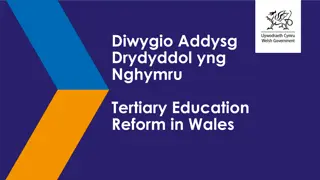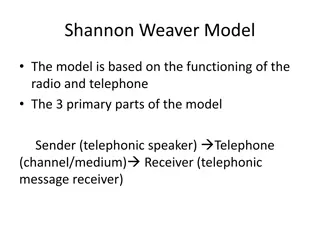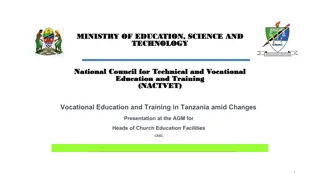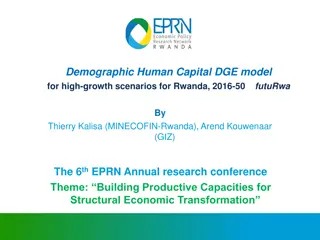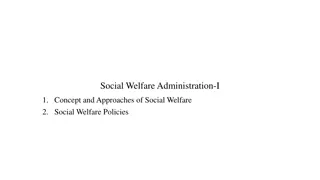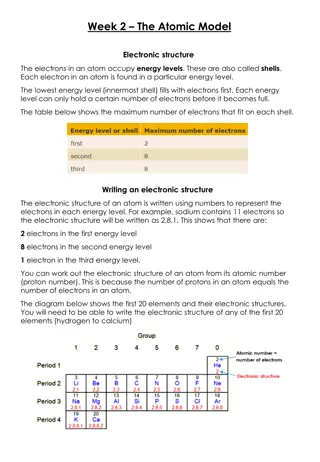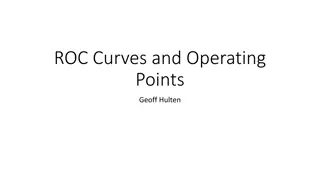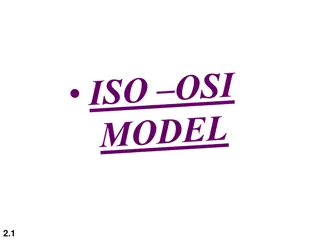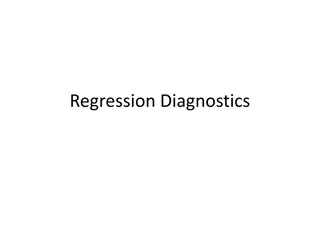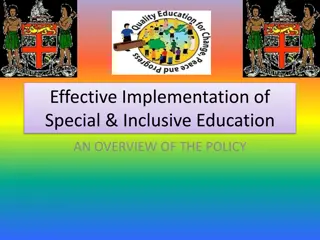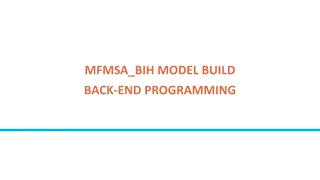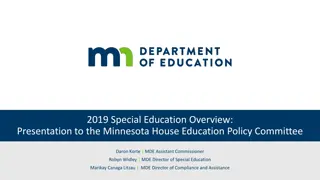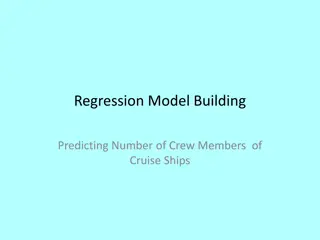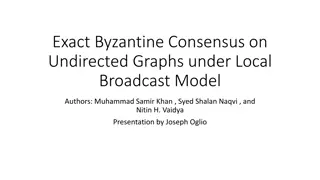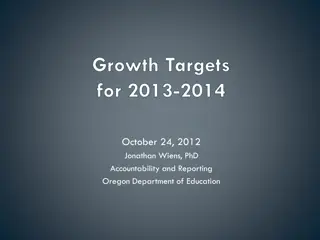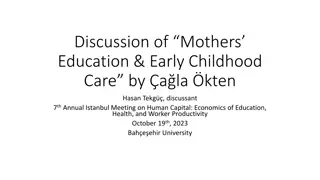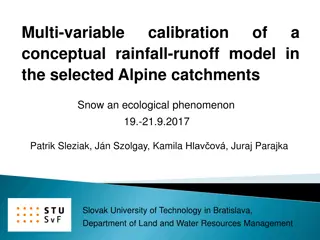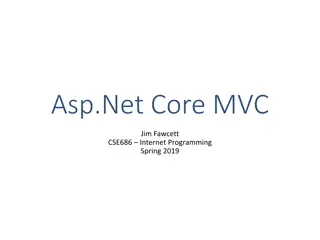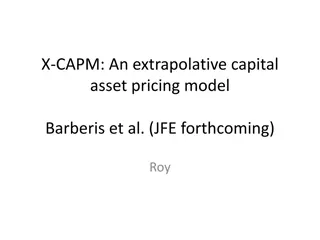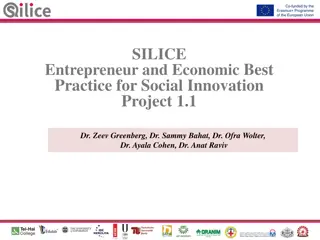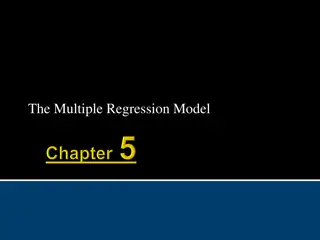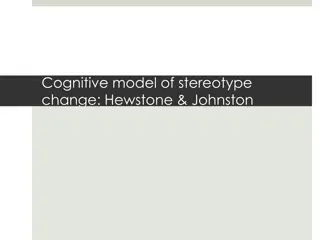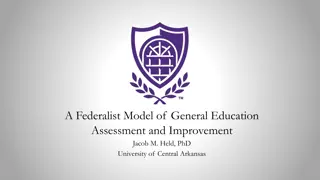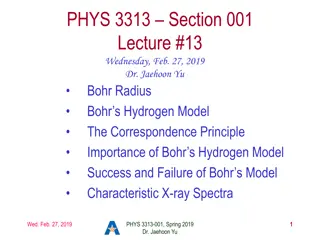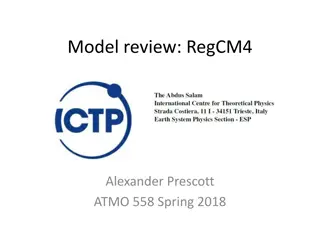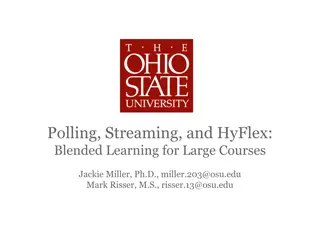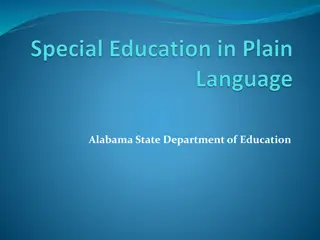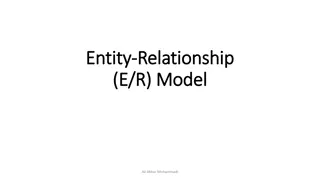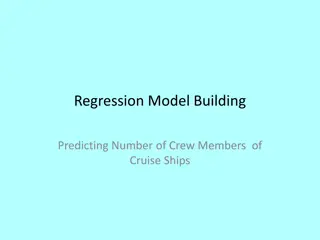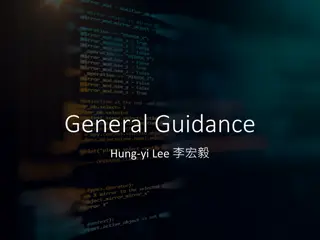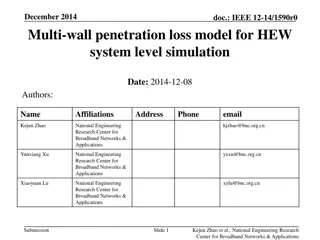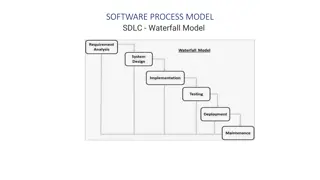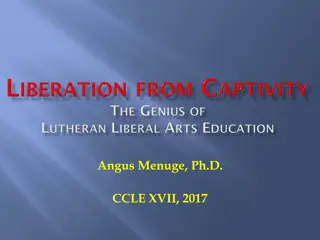SACE Teachers Conference: Enhancing Professional Development in Education
The SACE Teachers Conference focuses on improving teacher education through developing a National Framework for Teacher Education in SA. The Ministerial Committee on Teacher Education aims to create a coordinated system for both initial and continuing professional education. Recommendations include
1 views • 34 slides
Building a Macrostructural Standalone Model for North Macedonia: Model Overview and Features
This project focuses on building a macrostructural standalone model for the economy of North Macedonia. The model layout includes a system overview, theory, functional forms, and features of the MFMSA_MKD. It covers various aspects such as the National Income Account, Fiscal Account, External Accoun
2 views • 23 slides
NAMI Family Support Group Model Overview
This content provides an insightful introduction to the NAMI family support group model, emphasizing the importance of having a structured model to guide facilitators and participants in achieving successful support group interactions. It highlights the need for a model to prevent negative group dyn
6 views • 23 slides
Tertiary Education Reform in Wales: The Future of Learning
The Tertiary Education and Research (Wales) Act aims to establish the Commission for Tertiary Education and Research (CTER) to oversee strategy, funding, and supervision of post-compulsory education in Wales. This legislation dissolves the Higher Education Funding Council for Wales (HEFCW) and focus
3 views • 20 slides
Understanding Entity-Relationship Model in Database Systems
This article explores the Entity-Relationship (ER) model in database systems, covering topics like database design, ER model components, entities, attributes, key attributes, composite attributes, and multivalued attributes. The ER model provides a high-level data model to define data elements and r
0 views • 25 slides
Communication Models Overview
The Shannon-Weaver Model is based on the functioning of radio and telephone, with key parts being sender, channel, and receiver. It involves steps like information source, transmitter, channel, receiver, and destination. The model faces technical, semantic, and effectiveness problems. The Linear Mod
0 views • 8 slides
Enhancing Capacity of Church Education Facilities for Education Transformation
The National Council for Technical and Vocational Education and Training (NACTVET) in Tanzania is focused on enhancing the capacity of church education facilities to implement ongoing education transformation. The presentation outlines the structure of Vocational Education and Training (VET) in Tanz
0 views • 21 slides
Demographic Human Capital DGE Model for High-Growth Scenarios in Rwanda
This study focuses on a Demographic Human Capital Dynamic General Equilibrium (D-DGE) model for analyzing high-growth scenarios in Rwanda from 2016 to 2050. It explores the interactions of demographic dynamics, human capital, public infrastructure, and debt within a long-term growth framework. The m
0 views • 28 slides
Importance of the Right to Education in Social Welfare Policies
The right to education is a fundamental human right recognized in various international conventions and laws. It includes provisions for free, compulsory primary education, accessible secondary education, and equitable higher education. Upholding this right is crucial for promoting equality, fosteri
0 views • 19 slides
Understanding Atomic Structure: Electrons, Energy Levels, and Historical Models
The atomic model describes how electrons occupy energy levels or shells in an atom. These energy levels have specific capacities for electrons. The electronic structure of an atom is represented by numbers indicating electron distribution. Over time, scientists have developed atomic models based on
0 views • 5 slides
Understanding ROC Curves and Operating Points in Model Evaluation
In this informative content, Geoff Hulten discusses the significance of ROC curves and operating points in model evaluation. It emphasizes the importance of choosing the right model based on the costs of mistakes like in disease screening and spam filtering. The content explains how logistical regre
7 views • 11 slides
Understanding the OSI Model and Layered Tasks in Networking
The content highlights the OSI model and layered tasks in networking, explaining the functions of each layer in the OSI model such as Physical Layer, Data Link Layer, Network Layer, Transport Layer, Session Layer, Presentation Layer, and Application Layer. It also discusses the interaction between l
1 views • 41 slides
Regression Diagnostics for Model Evaluation
Regression diagnostics involve analyzing outlying observations, standardized residuals, model errors, and identifying influential cases to assess the quality of a regression model. This process helps in understanding the accuracy of the model predictions and identifying potential issues that may aff
1 views • 12 slides
Effective Implementation of Special & Inclusive Education Policy Overview
Providing an overview of the effective implementation of special and inclusive education policy, this content discusses inclusive education, special education, traditional education systems, historical dissatisfaction with dual systems, and the importance of the policy for children with special need
0 views • 29 slides
MFMSA_BIH Model Build Process Overview
This detailed process outlines the steps involved in preparing, building, and debugging a back-end programming model known as MFMSA_BIH. It covers activities such as data preparation, model building, equation estimation, assumption making, model compilation, and front-end adjustment. The iterative p
0 views • 10 slides
Proposal for Radio Controlled Model Aircraft Site Development
To establish a working relationship for the development of a site suitable for radio-controlled model aircraft use, the proposal suggests local land ownership with oversight from a responsible agency. Collins Model Aviators is proposed as the host club, offering site owner liability insurance throug
0 views • 20 slides
Special Education Overview Presentation to Minnesota House Education Policy Committee
Presentation to the Minnesota House Education Policy Committee on Special Education Overview, including information on the Individuals with Disabilities Education Act (IDEA), IDEA Part B and Part C services, and guidelines for children with disabilities. The presentation covers key aspects such as f
0 views • 29 slides
UBU Performance Oversight Engagement Framework Overview
Providing an overview of the UBU Logic Model within the UBU Performance Oversight Engagement Framework, this session covers topics such as what a logic model is, best practice principles, getting started, components of the logic model, evidence & monitoring components, and next steps. The framework
0 views • 33 slides
Regression Model for Predicting Crew Size of Cruise Ships
A regression model was built to predict the number of crew members on cruise ships using potential predictor variables such as Age, Tonnage, Passenger Density, Cabins, and Length. The model showed high correlations among predictors, with Passengers and Cabins being particularly problematic. The full
0 views • 16 slides
Exact Byzantine Consensus on Undirected Graphs: Local Broadcast Model
This research focuses on achieving exact Byzantine consensus on undirected graphs under the local broadcast model, where communication is synchronous with known underlying graphs. The model reduces the power of Byzantine nodes and imposes connectivity requirements. The algorithm involves flooding va
0 views • 7 slides
Understanding Oregon's Growth Model for Education Accountability
Oregon's Growth Model for education accountability uses a system that compares student growth to academic peers in the state. School growth ratings are determined based on levels of growth in reading and math, with a focus on tracking student progress over time. By comparing growth percentiles and s
0 views • 25 slides
Importance of Mothers in Early Childhood Education
Mothers play a crucial role in early childhood education, especially in developing countries where many children lack access to formal education. Studies show a strong link between a mother's education level and the time she invests in her child's learning. By examining a 1997 education reform, rese
0 views • 8 slides
Calibration of Multi-Variable Rainfall-Runoff Model Using Snow Data in Alpine Catchments
Explore the calibration of a conceptual rainfall-runoff model in Alpine catchments, focusing on the importance of incorporating snow data. The study assesses the benefits of using multi-objective approaches and additional datasets for model performance. Various aspects such as snow cover, groundwate
0 views • 16 slides
Understanding Asp.Net Core MVC - Building Web Applications with Model-View-Controller Pattern
Asp.Net Core MVC is a framework for building web applications based on the Model-View-Controller pattern. The model manages application data and constraints, views present application state, and controllers handle requests and actions on the data model. Learn about the MVC structure, life cycle, mod
0 views • 22 slides
Understanding X-CAPM: An Extrapolative Capital Asset Pricing Model
This paper discusses the X-CAPM model proposed by Barberis et al., which addresses the challenges posed by investors with extrapolative expectations. The model analytically solves a heterogeneous agents consumption-based model, simulates it, and matches various moments. It explores how rational inve
0 views • 23 slides
Innovation and Social Entrepreneurship Initiatives in Higher Education
This project focuses on establishing a leading center for promoting innovation and social entrepreneurship within higher education institutions. It aims to encourage students and staff to develop creative solutions for community challenges, expand social involvement, and foster sustainable positive
0 views • 13 slides
Principles of Econometrics: Multiple Regression Model Overview
Explore the key concepts of the Multiple Regression Model, including model specification, parameter estimation, hypothesis testing, and goodness-of-fit measurements. Assumptions and properties of the model are discussed, highlighting the relationship between variables and the econometric model. Vari
1 views • 31 slides
Comparison of 1:1 Model in Clinical Education
The experience of a 1:1 model in clinical education is compared with literature, highlighting advantages such as peer support, autonomy, and job satisfaction, and disadvantages such as limited contact time and increased stress. The model's impact on productivity, student learning, and educator workl
0 views • 7 slides
Cognitive Model of Stereotype Change: Three Models Explored
The Cognitive Model of Stereotype Change, as researched by Hewstone & Johnston, delves into three key models for altering stereotypical beliefs: the bookkeeping model, the conversion model, and the subtyping model. These models suggest strategies such as adding or removing features to shift stereoty
0 views • 58 slides
A Federalist Model of General Education Assessment and Improvement
In this presentation, Dr. Jacob M. Held from the University of Central Arkansas introduces the concept of a Federalist model for assessing and improving general education. The key takeaways emphasize the importance of assessment processes for prompting improvement and fostering meaningful conversati
0 views • 34 slides
Understanding Bohr's Model of the Hydrogen Atom
Exploring the significance of Bohr's hydrogen model in physics, this lecture delves into the Bohr radius, the correspondence principle, and the success and limitations of his model. Discover how characteristic X-ray spectra contribute to our understanding of atomic structures, leading to the conclus
0 views • 14 slides
Overview of RegCM4 Model Features
RegCM4 is a community model developed since the 1980s, with over 800 scientists contributing to its advancements. It features a fully compressible, rotating frame of reference and a limited area dynamical core based on the Penn State/NCAR Mesoscale Model 5 (MM5). The model uses hydrostatic and nonhy
0 views • 14 slides
Enhancing Learning with the HyFlex Model: A Blend of Polling, Streaming, and Student Choice
The HyFlex model offers a dynamic approach to education, incorporating elements like polling, streaming, and student choice to cater to the diverse needs of large courses. With a focus on autonomy and flexibility, this model aims to engage students through interactive technologies such as backchanne
0 views • 41 slides
Special Education Process and Intervention Strategies in Alabama State Department of Education
Special Education Process and Intervention Strategies in Alabama's State Department of Education involve implementing intervention strategies in the general education program before referring a child for special education evaluation. The process includes referral meetings, consent for evaluation, in
0 views • 17 slides
Understanding Entity-Relationship Model in Databases
The Entity-Relationship Model (E/R Model) is a widely used conceptual data model proposed by Peter P. Chen. It provides a high-level description of the database system during the requirements collection stage. Entities represent things of independent existence, each described by a set of attributes.
0 views • 21 slides
Predicting Number of Crew Members on Cruise Ships Using Regression Model
This analysis involves building a regression model to predict the number of crew members on cruise ships. The dataset includes information on 158 cruise ships with potential predictor variables such as age, tonnage, passengers, length, cabins, and passenger density. The full model with 6 predictors
0 views • 15 slides
Understanding Model Bias and Optimization in Machine Learning
Learn about the concepts of model bias, loss on training data, and optimization issues in the context of machine learning. Discover strategies to address model bias, deal with large or small losses, and optimize models effectively to improve performance and accuracy. Gain insights into splitting tra
0 views • 29 slides
Analysis of Multi-Wall Penetration Loss Model for HEW System-Level Simulation
In December 2014, a multi-wall penetration loss model for HEW system-level simulation was proposed by Kejun Zhao, Yunxiang Xu, and Xiaoyuan Lu from the National Engineering Research Center for Broadband Networks & Applications. The model provides more accurate calculations of penetration loss in ind
0 views • 11 slides
Understanding the Waterfall Model in Software Development
The Waterfall Model is a linear-sequential life cycle model for software development. In this model, each phase must be completed before the next can begin, without overlaps. The sequential phases include Requirement Gathering, System Design, Implementation, Integration and Testing, Deployment, and
0 views • 7 slides
Philosophy of Liberal Arts Education and Freedom
Classical education programs at CUW emphasize a philosophy major with a focus on primary sources, history of philosophy, worldviews, bioethics, and apologetics. This education model seeks to equip individuals for freedom, drawing on the roots of liberal education in the concept of liberty as a means
0 views • 47 slides



